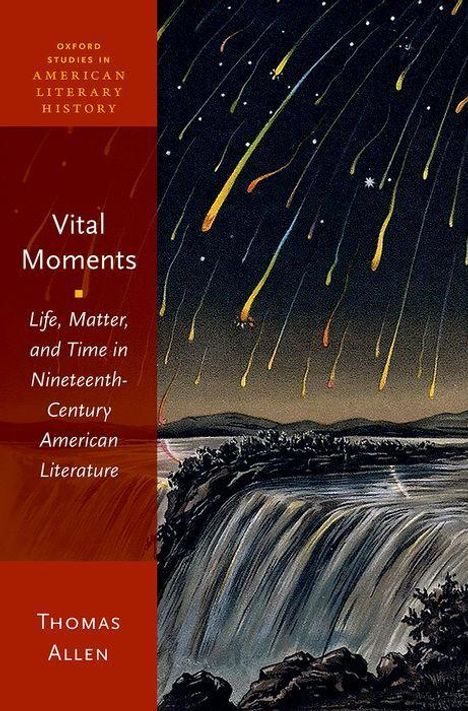Thomas Allen: Vital Moments, Gebunden
Vital Moments
- Life, Matter, and Time in Nineteenth-Century American Literature
Sie können den Titel schon jetzt bestellen. Versand an Sie erfolgt gleich nach Verfügbarkeit.
- Verlag:
- Oxford University Press, 03/2026
- Einband:
- Gebunden
- Sprache:
- Englisch
- ISBN-13:
- 9780197839300
- Artikelnummer:
- 12476547
- Umfang:
- 240 Seiten
- Gewicht:
- 476 g
- Maße:
- 221 x 155 mm
- Stärke:
- 23 mm
- Erscheinungstermin:
- 16.3.2026
- Hinweis
-
Achtung: Artikel ist nicht in deutscher Sprache!
Klappentext
The environmental and political crises humanity faces today have given rise to influential new theories of life, matter, and time. Vitalism, a controversial term describing the ideas of philosophers from Lucretius to Bergson, provides a common intellectual foundation linking many of the contemporary efforts to reconstruct our understanding of nonhuman agency and the place of humanity in the world.
Vital Moments argues that it is time to critically assess neovitalism's potential as a discourse of hope in light of the specific ways in which this potential has been shaped by the genealogy of vitalist perspectives. The emergence of modern vitalist representational forms in the nineteenth century was closely tied to colonialist projects of resource extraction and bioprospecting. Literary narratives linked political liberalism to a temporal structure in which life could be defined and controlled for the benefit of a privileged class. Romances of nonhuman agency idealized the democratic promise of life's plenitude even as chattel slavery and industrialization consigned many human beings to the status of things. Meanwhile, more subversive forms of vitalist narrative unsettled the hierarchy of animate and inanimate being.
These errant vitalisms envision other modes of human being--or being human--that lend themselves to more just and equitable possibilities of existence within the world's matrix of matter and time. By tracing the transformations of vitalist representational forms from the early nineteenth century to the present, Vital Moments seeks to recuperate the potential of this important perspective to help us imagine more truly democratic practices of life.



